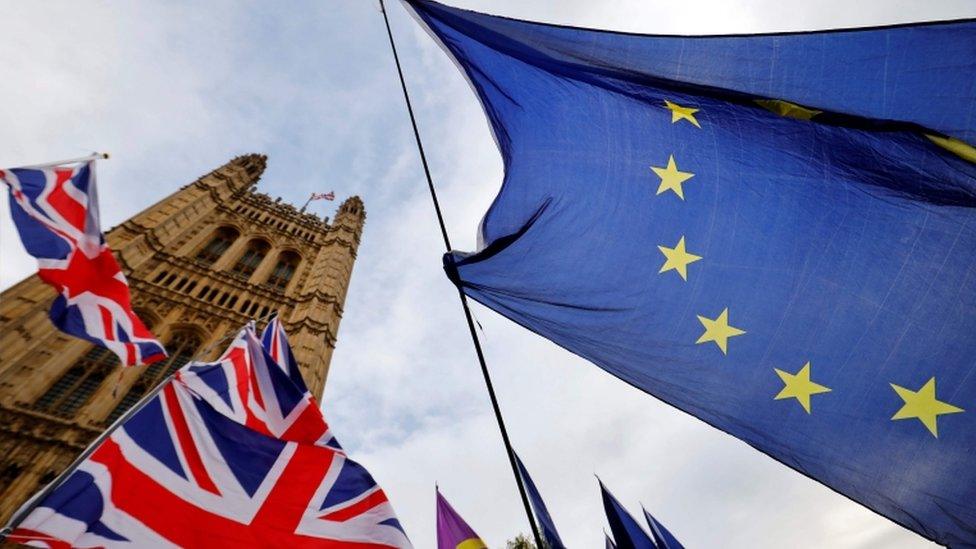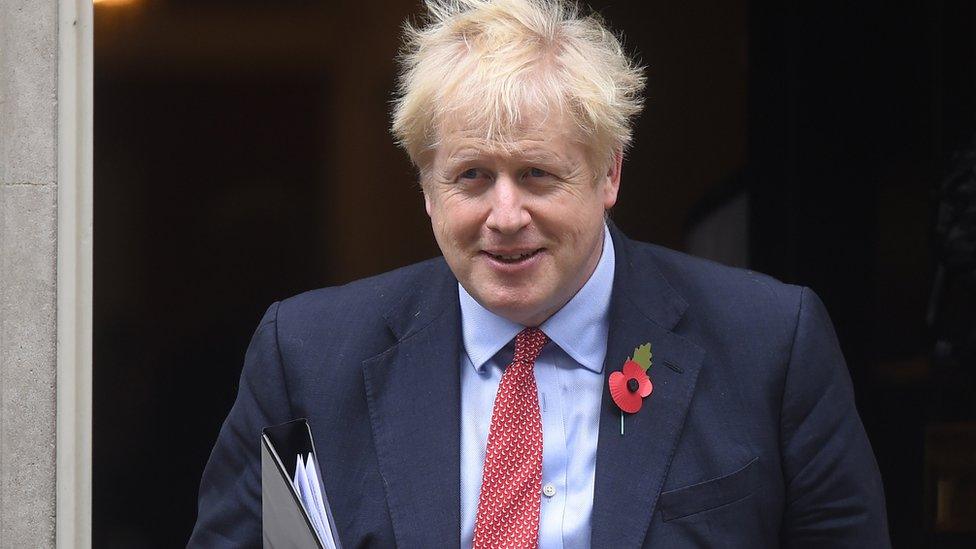Brexit deal means ‘£70bn hit to UK by 2029'
- Published
- comments

Boris Johnson's Brexit deal will leave the UK £70bn worse off than if it had remained in the EU, a study by the National Institute of Economic and Social Research (NIESR) has found.
It concluded that GDP would be 3.5% lower in 10 years' time under the deal.
The independent forecaster's outlook is one of the first assessments of how the economy will fare under the new deal.
But the Treasury said it plans on a 'more ambitious' agreement with the EU than 'NIESR is basing its findings on'.
A spokesman said: "We are aiming to negotiate a comprehensive free trade agreement with the European Union, which is more ambitious than the standard free trade deal that NIESR has based its findings on."
NIESR said approval of the prime minister's deal "would reduce the risk of a disorderly outcome, but eliminate the possibility of a closer trading relationship with the EU".
Despite the agreement between the EU and the UK removing uncertainty, customs and regulatory barriers would "hinder goods and services trade with the continent leaving all regions of the United Kingdom worse off than they would be if the UK stayed in the EU," NIESR said.
"We estimate that, in the long run, the economy would be 3.5% smaller with the deal compared to continued EU membership," it added.

The report also found the proposed free trade deal with the EU was slightly worse for the economy than Theresa May's deal of last year.
Her deal would have reduced the size of the economy by 3% over the same period, NIESR said.
Founded in 1938, NIESR has no party political ties and is the UK's oldest independent economic research institute.
A year ago, it conducted a study commissioned by the People's Vote which said GDP would be 3.9% lower by 2030.
Earlier this month, Bank of England governor Mark Carney welcomed the new Brexit deal, saying it was a "net economic positive" as it "takes away the tail risk of a disorderly Brexit".
However, the governor said that the "different" future relationship negotiated with the EU meant it "remains to be seen" if overall the deal would be as positive for the UK economy as the deal put forward by Mr Johnson's predecessor Mrs May.
Chancellor Sajid Javid has refused to recalculate Treasury assessments on the impact of the government's Brexit deal, saying it is "self-evidently in our economic interest".
Slowing demand
NIESR's study modelled different Brexit scenarios against a baseline of the UK staying in the EU.
In the case of a no-deal Brexit, it said GDP would be 5.6% lower than if the UK remained in the EU.


The government would dearly love to compare its agreement to the prospect of no deal.
On that basis, Boris Johnson's renegotiation looks better - on standard economic models such as those deployed by the respected National Institute of Economic and Social Research.
"New deal versus no deal" was the argument put to MPs when the Prime Minister was still trying to pass his deal. It was the position of the Chancellor, when he refused to publish his own version of such an analysis saying it was "self-evidently" better.
But we are now in a different situation.
The Prime Minister's deal is being put to the electorate versus a remain option or a different, far softer form of Brexit.
Crucially, NIESR calculates that the Johnson renegotiation leads to a slightly worse economic outcome than Theresa May's deal which it replaces, as the Bank of England Governor hinted to me earlier this month.
What is driving these results? The new deal creates more distance from the European Union economy, with more regulatory barriers to trade. Unlike May's deal, there could be checks on the origin of parts in the car industry, for example.
The overall impact of these extra barriers outweighs the benefit from extra certainty of "getting Brexit done". Individual businesses may well disagree. But the Treasury itself has chosen not to issue its own version of analysis such as this, even though it has the capacity to do so.

If the terms of trade with the EU remained unchanged, but "chronic uncertainty" persisted, GDP would be 2% lower.
"The economic outlook is clouded by significant economic and political uncertainty and depends critically on the United Kingdom's trading relationships after Brexit," NIESR said.
"Domestic economic weakness is further amplified by slowing global demand."
According to NIESR, the effects of Brexit on the UK economy are already being felt.
"The economy is estimated to be 2.5% smaller now than it would otherwise have been as a result of the 2016 Brexit vote," it said.
Correction 17th January 2020: An earlier version of this story said that in the event of a no-deal Brexit, NIESR forecast that the economy would shrink by 5.6%. This has been amended to make clear that the study said that GDP would be 5.6% lower than if the UK had remained in the EU.
- Published19 October 2019

- Published10 October 2019
